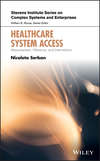Volume 275 pages
About the book
A guide to a holistic approach to healthcare measurement aimed at improving access and outcomes
Healthcare System Access is an important resource that bridges two areas of research—access modeling and healthcare system engineering. The book’s mathematical modeling approach highlights fundamental approaches on measurement of and inference on healthcare access. This mathematical modeling facilitates translating data into knowledge in order to make data-driven estimates and projections about parameters, patterns, and trends in the system. The complementary engineering approach uses estimates and projections about the system to better inform efforts to design systems that will yield better outcomes.
The author—a noted expert on the topic—offers an in-depth exploration of the concepts of systematic disparities, reviews measures for systematic disparities, and presents a statistical framework for making inference on disparities with application to disparities in access. The book also includes information health outcomes in the context of prevention and chronic disease management. In addition, this text:
Integrates data and knowledge from various fields to provide a framework for decision making in transforming access to healthcare Provides in-depth material including illustrations of how to use state-of-art methodology, large data sources, and research from various fields Includes end-of-chapter case studies for applying concepts to real-world conditions Written for health systems engineers, Healthcare System Access: Measurement, Inference, and Intervention puts the focus on approaches to measure healthcare access and addresses important enablers of such change in healthcare towards improving access and outcomes.










